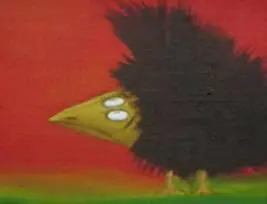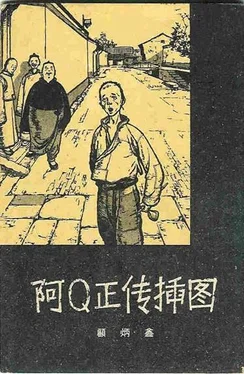Among Lu Xun's native fiction, " Village Opera" is the most exemplary, in its skillful description and praise of the virtues of peasants.
Some works in Wandering deals with peasant women's fate. The portrait of Mrs. Xianglin in "The New Year Sacrifice" is again a forceful indictment of the life-destroying feudal code of ethics. "Divorce" is the last of Lu Xun's stories that deal with social realities. It reveals, very profoundly, the situation in rural areas after the 1911 Revolution and points out that the fate of peasant women had still not at all changed.
"In the Wine Shop," "Soap," and "The Misanthrope," in Wandering, reflects intellectuals' life.
"Old Tales Retold" draws materials from ancient myths and historic stories, greatly broadening the subject matter of Lu Xun's fiction, and is cherished by many scholars and folklorists.
Lu Xun's fiction embodies a spirit of sober realism.
By learning from the concise, flexible, and varied structure of foreign fiction, Lu Xun broke away from the exclusive form of traditional Chinese fiction, which had been written only in chapters, to create a new form for modern Chinese fiction. Therefore, Lu Xun is looked upon as the father of the modem Chinese fiction.
The essay was the form used most frequently by Lu Xun (1881-1936) in his literary creation. His essays reflect his image as a committed revolutionary. Most of his essays are collected in Three Leisures, Two Hearts, Demi-Concession Studio Essays, The Second Demi-Studio Essays, and The Last Demi-Concession Studio Essays.
Lu Xun's essays cover a wide range of topics, with two major points of focus. First, they reflect Chinese society with considerable depth and breadth. From his essays people can grasp a general idea of China 's modern and contemporary history. Each of the essays seems to concern only small and even trivial matters, but they come together to form an integral social outlook. Secondly, his essays look hard at the question of reforming the weaknesses in the Chinese character.
Lu Xun's essays are intensely figurative. The logic in his articles, including reasoning, argument, criticism, and refutation, is embodied through distinctive images. Therefore his essays are of strong artistic appeal. The style of the essays is free and diverse, and short commentary is the most frequently used form. The tone of the essays is solemn and awe-inspiring, fresh and meaningful, unrestrained and militant, or biting and convincing. Lu Xun's essays hold a significant position in modern Chinese literature.
Lu Xun is also the important founder of the modern prose poem. Works belonging to this category are collected in Wild Grass, and fall into two categories: (1) satire of everyday life and attack on corrupt politics, as represented by "Dog's Refutation," "Revenge," and "In Faint Blood" ; and (2) his own depression and struggles to find a way out, as represented by "Autumn Night," "Passerby, " and "Farewell to Shadow."
Wild Grass is a fine work of symbolism. The various images created by way of symbolic metaphors have great artistic appeal.
Lu Xun's reminiscent prose was compiled in Dawn Blossoms Collected at Dusk. Some works in this collection follow the traditions of classical prose – simple narration imbued with profound thought -, while retrospection on past days is accompanied by criticism of social reality.
***

[1]本篇最初分章发表于北京《晨报副刊》,自一九二一年十二月四日起至一九二二年二月十二日止,每周或隔周刊登一次,署名巴人。作者在一九二五年曾为这篇小说的俄文译本写过一篇短序,后收在《集外集》中;一九二六年又写过《阿Q正传的成因》一文,收在《华盖集续编》中,都可参看。
[2]“立言”:我国古代所谓“三不朽”之一。《左传》襄公二十四年载鲁国大夫叔孙豹的话:“太上有立德,其次有立功,其次有立言,虽久不废,此之谓不朽。”
[3]“名不正则言不顺”:语见《论语·子路》。
[4]内传:小说体传记的一种。作者在一九三一年三月三日给《阿Q正传》日译者山上正义的校释中说:“昔日道士写仙人的事多以‘内传’题名。”
[5]“正史”:封建时代由官方撰修或认可的史书。清代乾隆时规定自《史记》至《明史》历代二十四部纪传体史书为“正史”。“正史”中的“列传”部分,一般都是著名人物的传记
[6]宣付国史馆立“本传”:旧时效忠于统治阶级的重要人物或所谓名人,死后由政府明令褒扬,令文末常有“宣付国史馆立传”的话。历代编纂史书的机构,名称不一,清代叫国史馆。辛亥革命后,北洋军阀及国民党政府都曾沿用这一名称。
[7]迭更司(1812-1870):通译狄更斯,英国小说家。著有《大卫·科波菲尔》、《双城记》等。《博徒别传》原名《劳特奈·斯吞》,英国小说家柯南·道尔(1859-1930)著。鲁迅在一九二六年八月八日致韦素园信中曾说:“《博徒别传》是 Rodney Stone 的译名,但是 C。Doyle 做的。《阿Q正传》中说是迭更司作,乃是我误记。”
[8]“引车卖浆者流”所用的话:指白话文。一九三一年三月三日作者给日本山上正义的校释中说:“‘引车卖浆’,即拉车卖豆腐浆之谓,系指蔡元培氏之父。那时,蔡元培氏为北京大学校长,亦系主张白话者之一,故亦受到攻击之矢。”
[9]不入三教九流的小说家:三教,指儒教、佛教、道教;九流,即九家。《汉书·艺文志》中分古代诸子为十家:儒家、道家、阴阳家、法家、名家、墨家、纵横家、杂家、农家、小说家,并说:“诸子十家,其可观者九家而已。”“小说家者流,盖出于稗官。街谈巷语,道听途说者之所造也。…是以君子弗为也。”
[10]《书法正传》:一部关于书法的书,清代冯武著,共十卷。这里的“正传”是“正确的传授”的意思。
[11]“著之竹帛”:语出《吕氏春秋·仲春纪》:“著乎竹帛,传乎后世。”竹,竹
简;帛,绢绸。我国古代未发明造纸前曾用来书写文字。
[12]茂才:即秀才。东汉时,因为避光武帝刘秀的名讳,改秀才为茂才;后来有时也
沿用作秀才的别称。
[13]陈独秀办了《新青年》提倡洋字:指一九一八年前后钱玄同等人在《新青年》杂志上开展关于废除汉字、改用罗马字母拼音的讨论一事。一九三一年三月三日作者在给山上正义的校释中说:“主张使用罗马字母的是钱玄同,这里说是陈独秀,系茂才公之误。”
[14]《郡名百家姓》:《百家姓》是以前学塾所用的识字课本之一,宋初人编纂。为便于诵读,将姓氏连缀为四言韵语。《郡名百家姓》则在每一姓上都附注郡(古代地方区域的名称)名,表示某姓望族曾居古代某地,如赵为“天水”、钱为“彭城”之类。
[15]胡适之(1891-1962):即胡适,安徽绩溪人,买办资产阶级文人、政客。他在一九二○年七月所作《〈水浒传〉考证》中自称“有历史癖与考据癖”。
[16]“行状”:原指封建时代记述死者世系、籍贯、生卒、事迹的文字,一般由其家
Читать дальше













